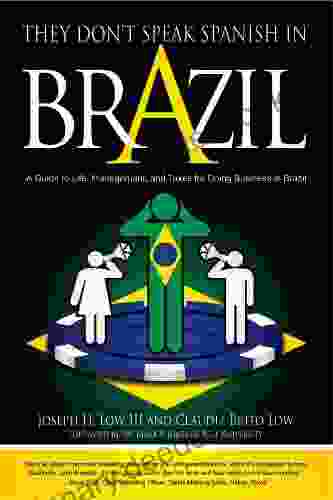They Don't Speak Spanish in Brazil: Unraveling Linguistic Diversity in South America

South America, a continent brimming with vibrant cultures and landscapes, is often associated with the Spanish language. However, one of its most prominent countries, Brazil, stands out as a linguistic outlier. Contrary to popular belief, Brazilian's native tongue is not Spanish but Portuguese. This intriguing language divide has its roots in a complex historical tapestry, which has shaped the linguistic landscape of South America.
The linguistic diversity of South America finds its origins in the pre-Columbian era, long before the arrival of European colonizers. The indigenous peoples of the continent spoke a multitude of languages, each unique to their respective tribes. This linguistic complexity was further compounded by the arrival of colonizers from Spain and Portugal in the 16th century.
Spain colonized vast territories in South America, including present-day Argentina, Peru, Bolivia, Ecuador, and Colombia. They imposed their language, Spanish, on these regions, which eventually became the dominant language spoken by the majority of the population.
4.3 out of 5
| Language | : | English |
| File size | : | 445 KB |
| Text-to-Speech | : | Enabled |
| Screen Reader | : | Supported |
| Enhanced typesetting | : | Enabled |
| Print length | : | 369 pages |
| Lending | : | Enabled |
Portugal, on the other hand, claimed Brazil as its colony. The Portuguese language thus became the official language of this region, shaping the linguistic destiny of Brazil.
Portuguese gained a foothold in Brazil through the establishment of trading posts along the coast. Over time, as these trading posts grew into settlements, the Portuguese language spread inland, carried by explorers, missionaries, and settlers.
The indigenous peoples of Brazil gradually adopted Portuguese as a means of communication with the colonizers. Intermarriage between Portuguese settlers and indigenous women also played a role in the dissemination of the language. By the 19th century, Portuguese had become the dominant language spoken throughout Brazil.
Several factors contributed to the perpetuation of linguistic differences between Brazil and its Spanish-speaking neighbors.
Geographical Isolation: Brazil's vast territory, with its impenetrable rainforests and mountainous regions, acted as a natural barrier to the spread of Spanish. This isolation prevented Spanish from gaining a significant foothold in the country.
Cultural Differences: The indigenous peoples of Brazil had distinct cultures and belief systems that differed from those of the Spanish colonies. This cultural divergence created a resistance to the adoption of Spanish.
Economic Factors: Brazil developed a thriving economy based on plantation agriculture and mining, which attracted immigrants from various parts of Europe, including Italy, Germany, and Poland. These immigrants brought their own languages and customs, further diversifying the linguistic landscape of Brazil.
Portuguese has become an integral part of Brazilian identity. It is the language of literature, music, art, and everyday communication. The distinct accent and regional variations of Portuguese spoken in Brazil reflect the country's rich cultural diversity.
The preservation of Portuguese as Brazil's national language has been a matter of great pride for Brazilians. The Brazilian constitution mandates the exclusive use of Portuguese in government, education, and public institutions.
While Portuguese is the predominant language in Brazil, there are several other languages spoken by minority groups. These include:
Indigenous Languages: Brazil is home to over 200 indigenous languages, each spoken by a distinct indigenous tribe. These languages have been officially recognized by the Brazilian government and are taught in some schools.
German: German-speaking communities exist in southern Brazil, descendants of German immigrants who arrived in the 19th century. Their language, known as Hunsrückisch, is still spoken in some areas.
Italian: Italian is also spoken by immigrant communities in Brazil, particularly in the southeastern state of São Paulo.
Spanish: Spanish is spoken by some people in Brazil, particularly in border regions with Spanish-speaking countries. However, it is not a widely spoken language in Brazil and is not considered an official language.
The fact that they don't speak Spanish in Brazil is a testament to the complex linguistic history of South America. The Portuguese language has played a vital role in shaping Brazilian identity and culture. While Spanish dominates the linguistic landscape of much of South America, Brazil stands as a unique linguistic island, offering a rich linguistic tapestry that reflects its multifaceted history.
4.3 out of 5
| Language | : | English |
| File size | : | 445 KB |
| Text-to-Speech | : | Enabled |
| Screen Reader | : | Supported |
| Enhanced typesetting | : | Enabled |
| Print length | : | 369 pages |
| Lending | : | Enabled |
Do you want to contribute by writing guest posts on this blog?
Please contact us and send us a resume of previous articles that you have written.
 Text
Text Story
Story Genre
Genre Reader
Reader Library
Library E-book
E-book Paragraph
Paragraph Sentence
Sentence Bookmark
Bookmark Shelf
Shelf Foreword
Foreword Preface
Preface Annotation
Annotation Codex
Codex Tome
Tome Bestseller
Bestseller Classics
Classics Library card
Library card Narrative
Narrative Memoir
Memoir Dictionary
Dictionary Thesaurus
Thesaurus Character
Character Resolution
Resolution Librarian
Librarian Card Catalog
Card Catalog Stacks
Stacks Periodicals
Periodicals Study
Study Academic
Academic Journals
Journals Reading Room
Reading Room Literacy
Literacy Dissertation
Dissertation Storytelling
Storytelling Awards
Awards Reading List
Reading List Book Club
Book Club Theory
Theory Textbooks
Textbooks Kenley Davidson
Kenley Davidson George Lakoff
George Lakoff Judith Eichler Weber
Judith Eichler Weber Swiss Chris
Swiss Chris Evelin Lindner
Evelin Lindner Otura Mercy
Otura Mercy Dawn Bikowski
Dawn Bikowski Gil Broza
Gil Broza Christian A Fardel
Christian A Fardel Rosetta E Ross
Rosetta E Ross Gene Del Vecchio
Gene Del Vecchio Alexander Hartung
Alexander Hartung Phyllis Greene
Phyllis Greene J Matthew Saunders
J Matthew Saunders Graham Seal
Graham Seal Colleen Coleman
Colleen Coleman Daniel Menaker
Daniel Menaker Kristen Mattson
Kristen Mattson James Crews
James Crews Cathy Gohlke
Cathy Gohlke
Light bulbAdvertise smarter! Our strategic ad space ensures maximum exposure. Reserve your spot today!

 Fyodor DostoevskyPerfect for Catch-Up and the 2024 and 2025 Exams: A Comprehensive Guide to...
Fyodor DostoevskyPerfect for Catch-Up and the 2024 and 2025 Exams: A Comprehensive Guide to... Alec HayesFollow ·8.3k
Alec HayesFollow ·8.3k Tennessee WilliamsFollow ·19.7k
Tennessee WilliamsFollow ·19.7k Gene PowellFollow ·6.6k
Gene PowellFollow ·6.6k Herbert CoxFollow ·2.5k
Herbert CoxFollow ·2.5k Jayson PowellFollow ·14.5k
Jayson PowellFollow ·14.5k Alexandre DumasFollow ·5.6k
Alexandre DumasFollow ·5.6k Ezekiel CoxFollow ·14.9k
Ezekiel CoxFollow ·14.9k Mario Vargas LlosaFollow ·18.8k
Mario Vargas LlosaFollow ·18.8k

 Jerome Powell
Jerome PowellBarbara Randle: More Crazy Quilting With Attitude -...
A Trailblazing Pioneer in...

 Jan Mitchell
Jan MitchellLapax: A Dystopian Novel by Juan Villalba Explores the...
In the realm of dystopian literature, Juan...

 Rodney Parker
Rodney ParkerOur Mr. Wrenn: The Romantic Adventures of a Gentle Man
Our Mr. Wrenn is a 1937 novel...
4.3 out of 5
| Language | : | English |
| File size | : | 445 KB |
| Text-to-Speech | : | Enabled |
| Screen Reader | : | Supported |
| Enhanced typesetting | : | Enabled |
| Print length | : | 369 pages |
| Lending | : | Enabled |
















